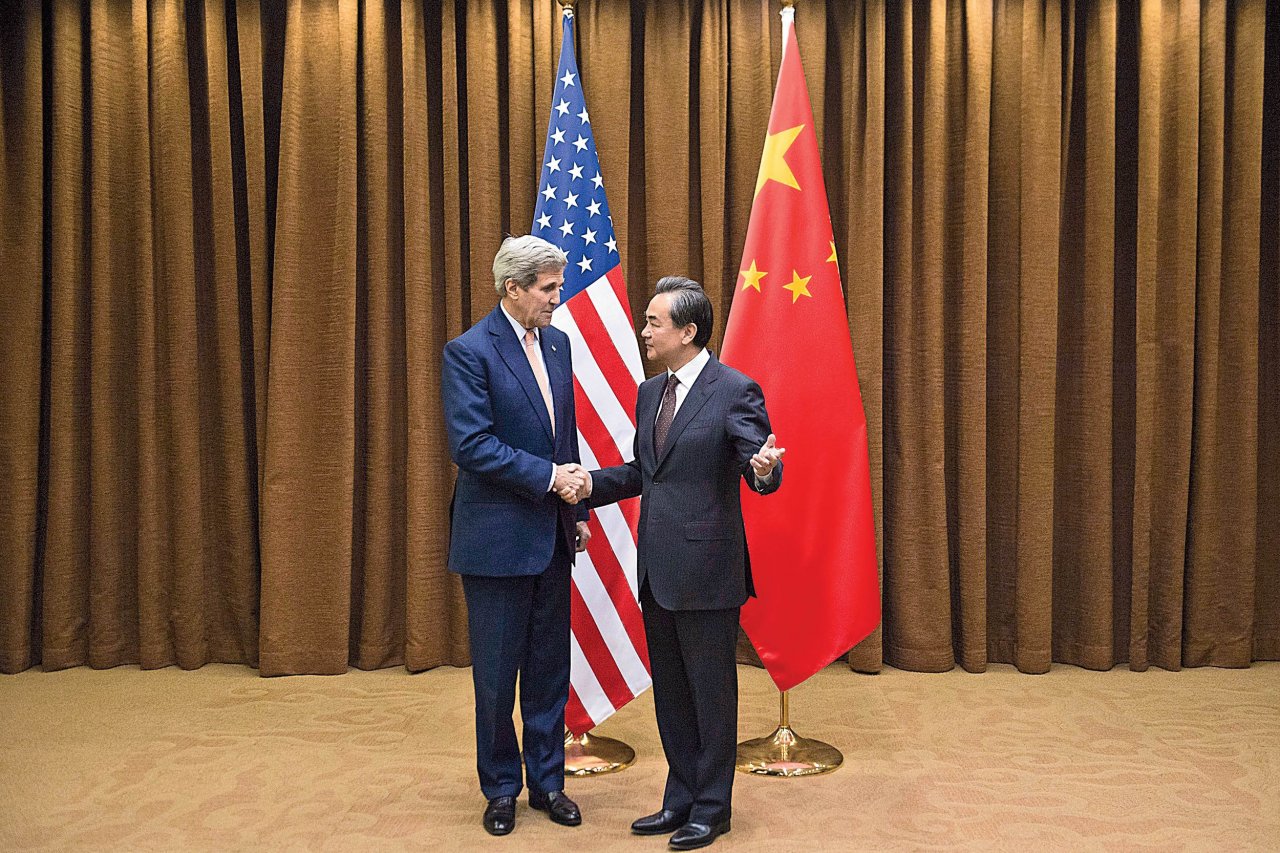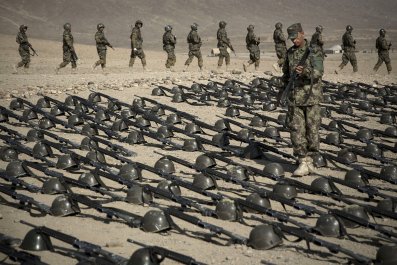Something that as recently as a decade ago was almost never discussed in polite company—the prospect for a prolonged geopolitical struggle between the United States and China (Cold War 2.0)—is now Topic A in the foreign policy salons of both Washington and Beijing. In the United States, the centrist Council on Foreign Relations issued a lengthy report calling for the U.S. to "revise" its "grand strategy" toward China. In Beijing, Liu Mingfu, a colonel in the People's Liberation Army and one of its most influential strategists, wrote in his recent book, The China Dream, "In the 21st century China and the United States will square off and fight to become the champion among nations.''
The current tension in the South China Sea, where Beijing is building artificial islands in the Spratlys, a contested chain claimed by six countries, certainly sounds like a Cold War in the making. The U.S. Defense Department let it be known in mid-May that it was considering sending surveillance aircraft and warships to within 12 nautical miles of the chain, as a signal to Beijing to back off. The Chinese Foreign Affairs Ministry immediately condemned Washington for even thinking about it.
Meanwhile, nine Chinese and Russian warships came together for joint exercises in the Mediterranean Sea—the most recent evidence of the warmer ties between the two historical antagonists. A month earlier, Vietnam, deeply distrustful of Beijing, hosted a dozen U.S. defense contractors for meetings in Hanoi. They came just eight days before celebrations marking the 40th anniversary of Vietnam's defeat of the United States.
War games, prospective weapons sales, a war of words over contested real estate in some far-flung part of the world. That's all pretty much standard Cold War fare, familiar to anyone in Moscow or Washington who fought the last one. But a Washington vs. Beijing Cold War 2.0—should it prove to be unavoidable—would be very different from its predecessor.
The fundamental, obvious difference is that Beijing would bring far more economic power to the contest than the Soviet Union ever did. Indeed, for Soviet citizens, the enduring image from the last days of Communism is empty shelves at the food store. And pretty much everywhere the Soviets exerted their influence—from Eastern Europe to Africa to Latin America—economic calamity ensued. The command and control, state-dominated form of economic management didn't work, and that—more than how many nuclear weapons Moscow possessed—was what mattered in the end.
Contrast that with China. Already the second-largest economy in the world, it may well surpass the United States as the biggest in a decade or so. While the state controls the commanding heights of the economy—banking, telecommunications, energy—it tries to do so in a market-friendly way, and it allows unfettered private enterprise in a range of industries (including, critically, high technology) that have helped drive China's extraordinary three-decade-long ascent from poverty. Alibaba is but one recent example of a private Chinese company with an increasingly global footprint. Remember all those great Soviet companies with initial public offerings of billions of dollars on the Nasdaq or the New York Stock Exchange? Right. You don't. Because there weren't any.
China is in the business of deploying its economic power abroad in a big way. It invests heavily in infrastructure projects in Africa. It uses its massive foreign exchange reserves to buy up resources—oil, gas and minerals—throughout Africa and Latin America. This is often—inaccurately—described as "soft" power. Economic power is not the same as soft power. Soft power has to do with lots of things—the form of government, the transparency of government, the accountability of elites to the broad citizenry, what a country stands for and stands against. The projection of economic power means the ability to put money in local pockets. Beijing is doing that aggressively, and, given its enormous accumulation of foreign exchange reserves, it is in a position to continue to do so for quite some time, even as its frantic economic growth now slows.
The United States, in the view of many analysts, is in a different and arguably more difficult place. Its hard power—its military assets—still dwarfs China's, even though Beijing has rapidly increased its defense spending in recent years. But the prospect of a Cold War between the two countries was—and to a certain extent still is—dismissed by many China hands in the U.S. because, as former National Security Council staffer Aaron Friedberg wrote last year in his book A Contest for Supremacy, "the enormous advantages the United States now enjoys are the product of its long-standing lead in the development and deployment of new technologies, and the unmatched ability of its huge and dynamic economy to carry the costs of military primacy."
Is the United States still more technologically advanced than China? Absolutely. Is it still more innovative. Yes. But those leads are narrowing, and the U.S. plainly faces a host of domestic economic issues—from debt to demographics to an economy seemingly stuck at stall speed—that are daunting. As Friedberg wrote, "Whether [the United States] will continue to enjoy [its economic advantages] in a long-term strategic rivalry with China is by no means obvious."
The other critical difference between Cold War 1.0 and the Cold War 2.0 that now looms is the simple fact that China is the most important market in the world for the Fortune 500. By contrast, the Soviet Union, for 99.5 percent of America's biggest companies, simply didn't exist. Beijing can use access to its market as leverage in geopolitical disputes, and in so doing will be playing to a core establishment constituency in the United States: big business. As long as China avoids an economic crisis that upends the current economic reality, that reality is going to be difficult for Washington to finesse as geopolitical competition intensifies.
There is, of course, tremendous irony in that. For decades, U.S. policy was to help China succeed economically. We had convinced ourselves that through trade and prosperity, political change would come in Beijing (just as it had in South Korea and Taiwan, former authoritarian economic success stories turned vibrant democracies). That notion is now long gone. The Chinese Communist Party, and its one-party rule, doesn't appear to be going anywhere. It's also playing a long game; its military is just a regional player now, but by 2049, when the party expects to celebrate its 100th anniversary in power, it may well be able to project force globally. That, anyway, is the intention of the more hawkish elements of the party and its military.
Washington had earnestly hoped that the days of a global struggle against a powerful adversary were gone, the stuff of history books. That it's now waking up and acknowledging a different reality is step one in what Liu Mingfu calls the central "fight" for the 21st century.





















